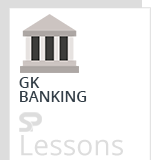 Introduction
Introduction
What is meant by Financial Awareness? Financial awareness foundation is financial literacy, which is defined as The ability to use knowledge and skills to effectively manage financial resources efficiently at a personal level and through the life cycle.
Financial Awareness is a section that is present in most of the banking competitive exams. Candidates planning to take up employment in the banking sector must be aware of many of the terms policies and other such important information related with financial awareness. The article Financial Awareness Quiz 27 provides quiz sets useful to the candidates while preparing Various Banking & Government Exams like IBPS RRB, SBI PO, SBI Clerk, SSC CPO, SSC CHSL. Financial Awareness Quiz 27 is veru useful to crack financial awareness sections of several bank and insurance exams.
 Quiz
Quiz
1. In a company, the use of price-sensitive corporate information by the company people to make gains or cover losses is known as -
-
A. Insider trading
B. Future trading
C. Foreign trading
D. Stock trading
E. None of the given options is true
-
A. Single Exchange Processing Agency
B. Single Euro Payments Area
C. Single Electronic Processing Agency
D. Super Electronic Purchase Agency
E. None of these
-
A. Development bonds
B. Insurance policies
C. Mutual funds
D. Sovereign wealth funds
E. None of the given options is true
-
A. Probability risk
B. Market risk
C. Inflation risk
D. Credit risk
E. None of the given options is true
-
A. Electronic Traded Funds
B. Exchange Time Funds
C. Exchange Traded Finance
D. Exchange Traded Flows
E. Exchange Traded Funds
1. To help boost liquidity particularly among small and marginal farmers in the farming sectors RBI has announced to increase the limit on collateral-free agriculture loans to what amount from Rs.1 lakh?
-
A. Rs.1.8 lakh
B. Rs.1.6 lakh
C. Rs.2.4 lakh
D. Rs.2.8 lakh
E. Rs.2.2 lakh
-
A. Rs. 1 crore
B. Rs. 2 crores
C. Rs. 3 crores
D. Rs. 5 crores
E. Rs. 1.5 crores
-
A. Paytm
B. Mobikwik
C. PhonePe
D. GooglePay
E. AmazonPay
-
A. MTNL
B. Airtel
C. Jio
D. BSNL
E. Idea
-
A. Punjab National Bank
B. ICICI Bank
C. Bank of Baroda
D. State Bank of India
E. Allahabad Bank
1. EFTPOS (electronic funds transfer at point of sale) is based on ------
-
A. SMS Alerts
B. Debit Cards
C. Credit Cards
D. Both A and B
E. Both B and C
-
A.
-
A. Recession
B. Depreciation
C. Stagflation
D. Depression
E. None of these
-
A. Central
B. Critical
C. Commercial
D. Core
E. Capital
-
A. Banking Regulation Act, 1949
B. The Banking Companies Act–1949
C. Chit Fund Act–1982
D. Negotiable Instrument Act, 1881
E. Other than the given options



